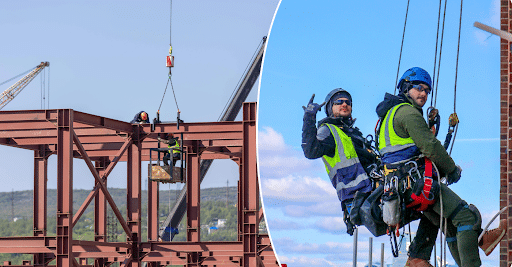When planning a construction project, whether for residential or commercial purposes, it’s easy to focus on the big-ticket items like materials, labor, and design.
However, one critical aspect often overlooked is budgeting for temporary construction site services, such as dumpsters, temporary power, temporary fencing, and portable restrooms. These services play a vital role in ensuring a project runs smoothly, efficiently, and safely.
Table of Contents
1. Efficiency and Productivity
One of the primary reasons to budget for temporary construction services is to enhance overall efficiency on the job site. Having a reliable system for waste disposal, such as dumpsters, keeps the site organized and reduces the risk of accidents caused by clutter.
This organization allows workers to focus on their tasks without unnecessary distractions, leading to increased productivity and faster project completion.
2. Safety and Compliance
Construction sites can be hazardous environments. Temporary fencing is essential for restricting access to the site and protecting both workers and the public. It helps prevent accidents and ensures compliance with local safety regulations.
Without proper barriers, the risk of injury increases, potentially leading to costly legal issues and delays. Allocating a budget for temporary fencing is not just a safety measure; it’s an investment in protecting your project and reputation.
3. Utilities and Convenience
Temporary power solutions are often necessary on construction sites, particularly for projects that require tools and equipment. Budgeting for temporary power ensures that your crew has access to electricity without delays, preventing work stoppages.
Additionally, portable restrooms are crucial for maintaining hygiene and worker morale. When workers have access to clean and convenient restroom facilities, it boosts productivity and creates a more positive work environment.
4. Waste Management
Construction projects generate significant amounts of waste, from leftover materials to packaging. Failing to plan for waste disposal can lead to unsightly, unsafe conditions and increased costs down the line.
By budgeting for dumpsters, you ensure that waste is disposed of regularly and responsibly, reducing the environmental impact and keeping the site compliant with local regulations. This proactive approach to waste management can also prevent potential fines and penalties.
5. Cost Management
Many construction projects operate on tight budgets. Overlooking temporary services can lead to unexpected costs and financial strain later in the project.
By anticipating these needs and budgeting accordingly, you can prevent last-minute expenses that may derail your project or force you to cut corners elsewhere. Including temporary construction site services in your initial budget helps maintain financial control throughout the project lifecycle.
6. Project Timeline
Delays in construction can be costly, both financially and in terms of reputation. When temporary services are not adequately planned for, projects can be delayed due to lack of access to necessary facilities, such as power or waste disposal.
By budgeting for these services upfront, you reduce the risk of project delays and help ensure that your construction timeline stays on track.
Conclusion
Budgeting for temporary construction site services like dumpsters, temporary power, temporary fencing, and portable restrooms is often overlooked, yet it is a crucial aspect of both residential and commercial construction projects.
By prioritizing these services, you enhance efficiency, maintain safety, and promote worker satisfaction. Taking the time to plan for these temporary needs not only saves you money in the long run but also contributes to the successful completion of your construction project. So, next time you’re drafting a construction budget, don’t forget to account for these essential services!





